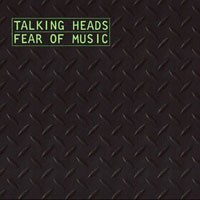As a producer, Brian Eno is probably best known for the "Berlin trilogy" of albums he recorded with David Bowie. Equally deserving praise is another trilogy, this time with post-punk heroes Talking Heads. With More Songs About Buildings and Food, Fear of Music and Remain in Light, the Heads found critical and commercial acclaim, rightfully so. The strongest of the three is arguably Fear of Music, a record which takes the band's nervous post-punk energy and applies it more specifically to disco, or whatever constitutes Eno's version of disco.
Considering its principle tracks were recorded in the loft that served as the band's pre-Sire practice space, through a truck, Fear of Music sounds pretty darn good. The alien pop atmosphere that dominated Bowie's albums carries over here, and while it would be disrespectful to imply that Eno alone shaped the band's studio sound, he sure did know how to record the Talking Heads. Fear of Music is crisp and punchy, but unafraid to go haunting when need be.
"Heaven" just so happens to be such a chilling number. "Heaven is a place where nothing ever happens" goes the memorable, echoing chorus. It's a rarity for the record's tone, although "Memories Can't Wait" and "Animals" get nightmarishly trippy. Fear of Music is a dance record, but it can get downright threatening when it wants, especially during the second half.
These moments lend the danceable tracks more gravitas, and vice versa. "I Zimbra" doesn't actually mean anything--it's just Dadaist jabberwocky--but man does it have a nice groove. So do "Mind" and "Cities," with the latter being one of the greatest Talking Heads songs of all time. These songs are proof that not all post-punk needs to be angular and robotic, that it can in fact sometimes be funky.
Plenty of factors contribute to that funk. It's in the hooks. The bass, guitars, drums and synth. And it's certainly in David Byrne's delivery. The guy was always a constant blur of energy, but Fear of Music finds a way harness that energy. Byrne gets to go big here, and he delivers some tasty one liners along the way (Is there any line more post-punk than "Never listen to electric guitar," from "Electric Guitar?").
Talking Heads constantly refined their style over the course of their run, but Fear of Music captures the band at a critical juncture. They had begun to grow out of their CBGB confines, but some of that 77 raggedness sticks around, lending a touch of live energy. There have been plenty of post-punk records since then; few are as good.
